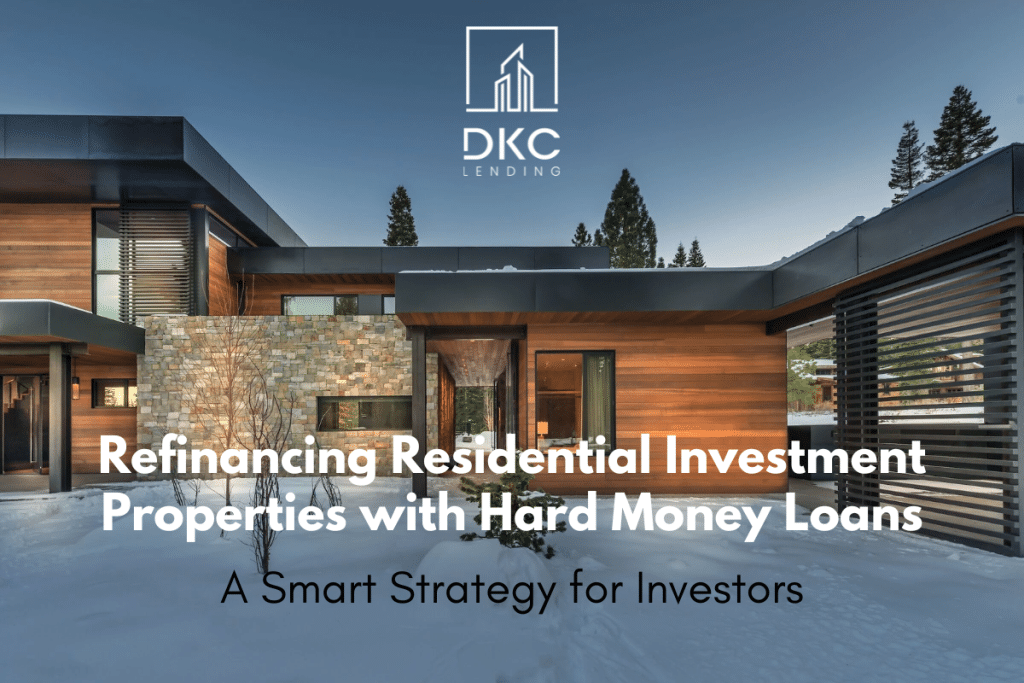Refinancing is a crucial strategy for real estate investors looking to optimize cash flow, reduce costs, or free up capital for new investment opportunities. However, traditional refinancing options come with strict lending requirements, slow approval processes, and limitations that prevent investors from accessing the funds they need when they need them.
Hard money loans provide an alternative refinancing solution, allowing investors to tap into their property’s equity quickly and efficiently. Whether refinancing to consolidate debt, access working capital, or restructure an existing loan, hard money lenders offer speed, flexibility, and an asset-based approach that favors real estate investors.
Let’s explore the advantages of refinancing residential investment properties with hard money loans, detailing how investors can use this strategy to strengthen their portfolios and accelerate growth.
Challenges in Securing Traditional Refinancing for Investment Properties
Strict borrower qualifications. Conventional lenders evaluate credit scores, tax returns, and debt-to-income ratios, often disqualifying investors who do not meet rigid financial requirements.
Lengthy underwriting process. Refinancing with a bank can take months, requiring extensive documentation, appraisals, and financial reviews, delaying access to needed capital.
Low loan-to-value ratios. Traditional lenders offer conservative refinancing terms, often capping loan amounts at a percentage of the property’s current value, limiting the investor’s ability to access cash.
Limited options for non-conventional properties. Many lenders hesitate to refinance properties that require renovations, have tenant vacancies, or do not fit standard lending criteria, restricting options for investors with diverse portfolios.
These challenges highlight why investors turn to hard money lenders for refinancing solutions that align with their business needs and financial goals.
The Hard Money Lending Advantage for Refinancing Investment Properties
Fast approval and funding. Hard money lenders prioritize property value over borrower financials, allowing refinancing approvals and funding to occur within weeks rather than months.
Flexible loan structures. Hard money loans provide adaptable refinancing terms, including interest-only payments and short-term durations, helping investors effectively improve cash flow and reinvest capital.
Higher loan-to-value ratios. Investors can refinance at competitive loan-to-value (LTV) ratios, enabling them to access more of their property’s equity than traditional lenders allow.
Refinancing for distressed or value-added properties. Hard money lenders focus on the future value of a property rather than its current condition, making it easier to refinance properties undergoing renovations or repositioning.
Debt consolidation for improved financial management. Investors can use hard money refinancing to consolidate high-interest debt, streamline multiple loan payments, and improve overall financial efficiency.
These advantages position hard money loans as a strategic refinancing tool for real estate investors looking to optimize their investments.
Case Study: Using Hard Money Loans for a Strategic Refinance
Michael, an experienced investor, owned multiple residential properties, one of which had appreciated significantly over the past three years. He wanted to refinance the property to pull out equity and use the capital to acquire additional investment properties.
When he approached a traditional lender, he faced months of delays due to strict underwriting requirements, credit score evaluations, and financial documentation requests. Frustrated with the process, he turned to a hard money lender.
The lender assessed the property’s value and approved the refinancing loan within two weeks. With immediate access to cash, Michael acquired two additional investment properties, increasing his rental income and diversifying his portfolio. The speed and flexibility of hard money refinancing allowed him to capitalize on an opportunity that would have been lost had he waited for traditional financing.
Strategic Benefits of Refinancing with Hard Money Loans
Unlocking property equity for reinvestment. Investors can access cash from their properties to fund additional acquisitions, renovations, or business growth without selling assets.
Improving cash flow management. By refinancing into a loan with interest-only payments or better terms, investors can reduce monthly expenses and improve liquidity.
Stabilizing and restructuring debt. Hard money loans provide options for consolidating high-interest or short-term debt, reducing financial strain, and improving overall investment stability.
Funding value-add improvements. Investors can refinance into a hard money loan to finance renovations that increase a property’s value and rental income potential.
Bridging to long-term financing. Hard money loans serve as a short-term refinancing solution while investors transition to long-term mortgage financing once conditions stabilize.
By refinancing with hard money loans, investors can strategically manage their capital, enhance portfolio performance, and seize new opportunities in the market.
Key Considerations When Refinancing with Hard Money Loans
Understanding total loan costs. Hard money loans typically have higher interest rates than traditional refinancing options, making it essential to factor total costs into investment calculations.
Having a clear exit strategy. Since hard money loans are short-term, investors must plan for repayment through property sales, long-term refinancing, or rental income.
Evaluating property appreciation potential. Investors should assess market trends and property appreciation forecasts to ensure that refinancing aligns with long-term financial goals.
Choosing a reputable lender. Working with an experienced hard money lender ensures fair loan terms, transparent underwriting, and support throughout the refinancing process.
Careful planning and execution are key to making hard money refinancing a successful strategy for investment growth.
Best Practices for Success with Hard Money Refinancing
Monitor market conditions. Understanding real estate cycles and interest rate trends helps investors make informed refinancing decisions.
Time refinancing strategically. Investors should refinance at optimal moments to secure the best loan terms and maximize investment potential.
Maintain strong property records. Keeping detailed financials and maintenance records enhances credibility with lenders and streamlines the refinancing process.
Work with knowledgeable professionals. Partnering with experienced real estate advisors, lenders, and financial strategists ensures well-structured refinancing plans.
By following these best practices, investors can use hard money refinancing to optimize their portfolios and strengthen their financial position.
Conclusion
Refinancing with hard money loans offers real estate investors an effective way to access equity, improve cash flow, and consolidate debt without the delays and restrictions of traditional financing. Whether used for reinvestment, restructuring, or value-add improvements, hard money loans provide the speed, flexibility, and accessibility needed to support investment success.
For investors looking to refinance their residential investment properties, DKC Lending provides expert guidance, competitive loan structures, and the fast funding needed to unlock new opportunities. With the right financing partner, investors can maximize their portfolios, navigate market shifts, and achieve long-term financial growth in residential real estate.


